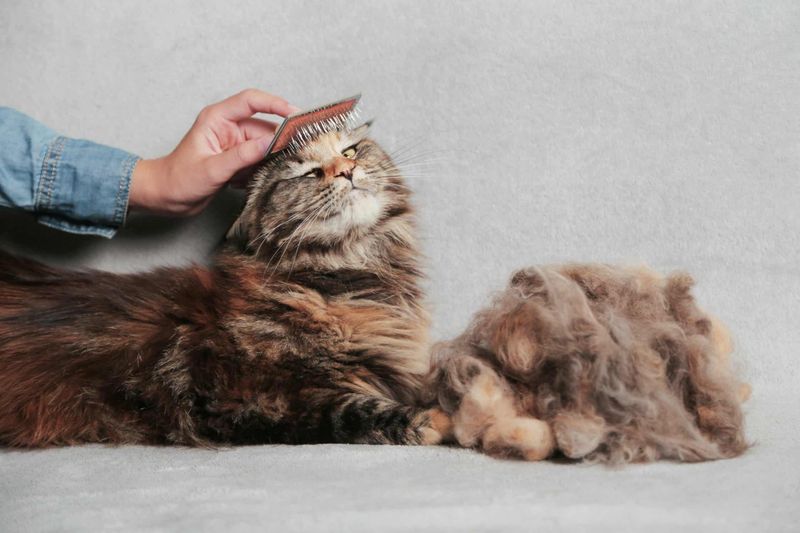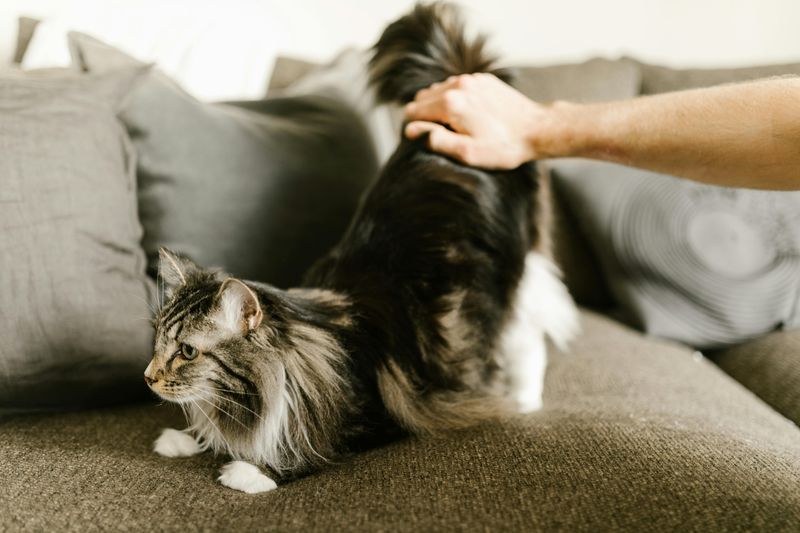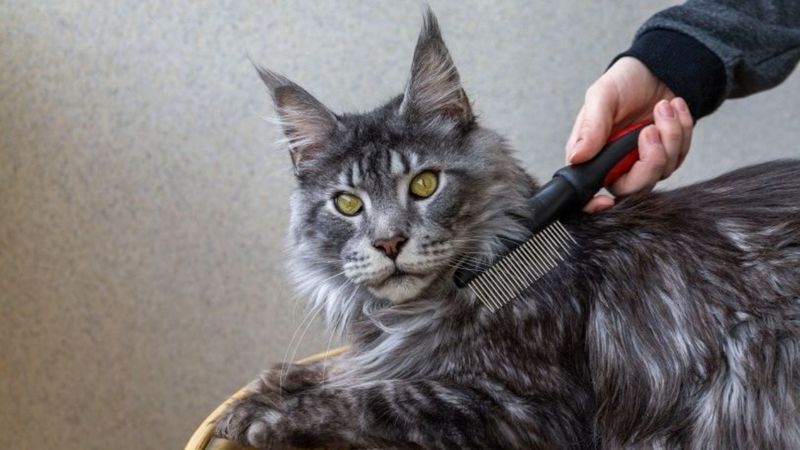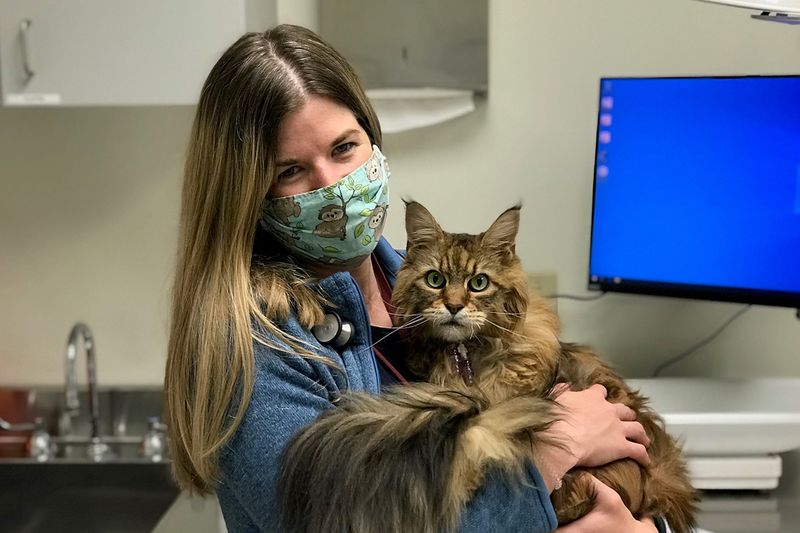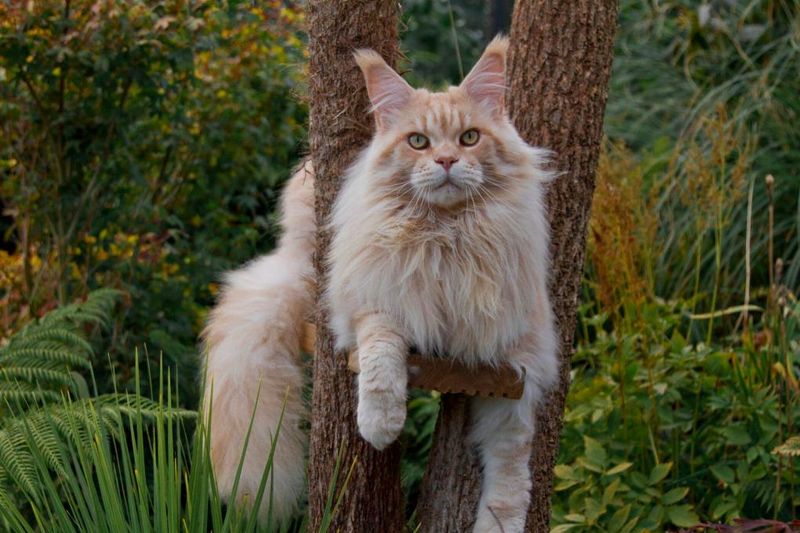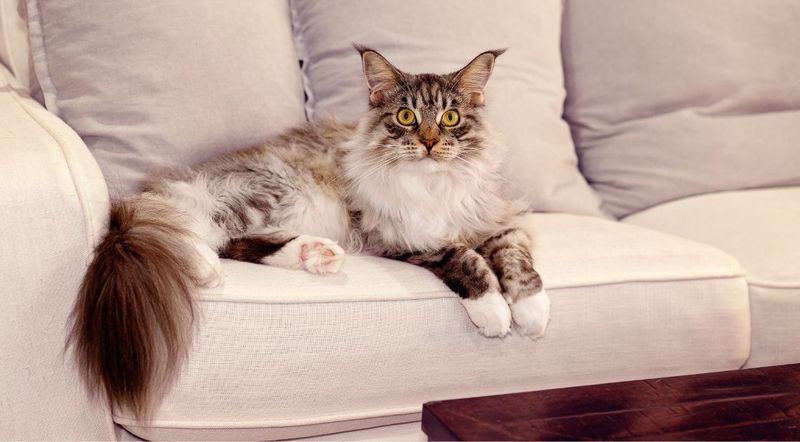📖 Table of Content:
- 1. They’re Massive
- 2. Extreme Shedding
- 3. High Grooming Needs
- 4. Expensive Upkeep
- 5. Health Concerns
- 6. They Need Attention
- 7. Very Vocal
- 8. They Can Be Clingy
- 9. Can Be Destructive
- 10. Require Stimulation
- 11. May Intimidate Other Pets
- 12. Long Lifespan, Long Commitment
- 13. Big Litter Box Needs
- 14. Messy Eaters
- 15. Not Ideal for Minimalists
Few cats are as majestic and awe-inspiring as the Maine Coon. With their lion-like manes, tufted ears, and long bushy tails, these gentle giants captivate nearly everyone who meets them. Often described as the “dogs of the cat world,” they offer a combination of affection, size, and personality that’s rare in the feline universe.
But not everything about the Maine Coon is as glamorous as their photos suggest. While their personalities can be affectionate and playful, owning one comes with significant challenges and responsibilities. From health issues to lifestyle mismatches, many potential owners don’t fully grasp the day-to-day realities of living with such a large and demanding breed.
This article isn’t meant to scare you away from Maine Coons, but rather to provide a realistic perspective. If you’re thinking about adding one to your family, it’s important to know exactly what you’re signing up for. These 15 reasons aren’t criticisms—they’re caution flags. They help ensure you’re not making an emotional decision based on appearances alone. Let’s explore the less-discussed side of Maine Coon ownership so you can make a truly informed choice. You may discover they’re not the perfect fit you initially imagined.
1. They’re Massive
When people picture a house cat, they usually imagine a small, nimble creature that can curl up easily in a windowsill. Maine Coons, however, are more like small bobcats in size, with adult males often weighing 18 to 25 pounds. This kind of size brings with it logistical challenges: they need larger carriers, stronger furniture, and more living space. Cuddling may become more of a lap takeover than a cozy nap. Small children or elderly family members might even be intimidated by their presence. Don’t underestimate the spatial demands of a feline this large. It’s not just a cat—it’s a lifestyle.
2. Extreme Shedding
Every season seems to bring a fresh layer of fur from a Maine Coon. Whether it’s clinging to your couch, your clothes, or floating around the room like tumbleweeds, their dense coat sheds constantly. Owning one means becoming best friends with your vacuum cleaner and lint roller. Allergies can worsen with this level of fur in the air and on surfaces. Don’t expect shedding to taper off—it’s a year-round commitment. Even the cleanest home will battle constant fur accumulation. For tidy-minded folks, this can be a deal-breaker.
3. High Grooming Needs
Unlike short-haired cats that can often manage their own grooming, Maine Coons need human help to stay sleek and healthy. Brushing several times a week isn’t optional—it’s mandatory. Their fur tangles easily and can form painful mats if neglected even briefly. Grooming becomes a time-consuming chore, not a casual activity. Neglect can lead to costly grooming appointments or even medical issues. Some cats may resist grooming, making the process stressful for both of you. This isn’t a low-maintenance pet when it comes to fur care.
4. Expensive Upkeep
At first glance, you may not think of a Maine Coon as a high-cost animal, but the expenses pile up quickly. They eat more due to their size, and higher-quality food is often required to maintain coat and joint health. Vet bills can be significantly higher, especially for their common hereditary conditions. You may also find yourself investing in heavy-duty toys, climbing structures, and grooming tools. Litter box maintenance is more intense and frequent, too. These aren’t “starter” pets for casual owners. Budget accordingly—or risk getting in over your head.
5. Health Concerns
Genetics aren’t always kind to the Maine Coon. They’re predisposed to several serious health issues like hypertrophic cardiomyopathy, hip dysplasia, and spinal muscular atrophy. Preventative care is essential, and annual heart screenings may be recommended. These conditions aren’t always curable and often require lifelong management. Insurance can help, but it’s not a cure-all. If you’re not ready for long-term medical involvement, reconsider this breed. It’s not just a matter of if—but often when these issues appear.
6. They Need Attention
Socially inclined and emotionally intelligent, Maine Coons thrive on human interaction. If left alone too long, they can become anxious, bored, or even depressed. These cats may not appreciate the independent solitude that other breeds tolerate. You may find yourself guilt-tripped by their expressive eyes or sorrowful chirps. Some will act out by being destructive when they feel ignored. They’re more like canine companions than aloof felines. Time, attention, and interaction aren’t bonuses—they’re requirements.
7. Very Vocal
Forget the typical soft meows you hear from most cats—Maine Coons talk in their own special language. They chirp, trill, and whine in long, drawn-out conversations. This can be charming at first but exhausting over time, especially during the early morning hours. Some owners even compare their vocalizations to a toddler constantly asking questions. If silence is golden in your household, this cat will break that peace. Their voices carry and are surprisingly loud. Sound sensitivity and sleep schedules may take a hit.
8. They Can Be Clingy
Unlike independent breeds that keep to themselves, Maine Coons will follow you from room to room. They want to be part of your every activity—whether you’re cooking, showering, or trying to work. While this can feel heartwarming, it can also become stifling. Some people aren’t comfortable with a pet that shadows them so closely. Alone time becomes a rarity, and privacy takes a hit. Consider how much personal space matters to you before adopting one. Not everyone wants a furry stalker.
9. Can Be Destructive
When under-stimulated or left alone for too long, Maine Coons can unleash their energy in less-than-desirable ways. Scratching furniture, knocking over items, or even opening drawers isn’t beyond them. Their intelligence and strength make it easy for them to wreak havoc in short bursts. They often need more than just scratching posts—they need full-blown activity centers. If you don’t provide enrichment, they’ll create it themselves. And you might not like how they choose to do that. Your home could pay the price for their boredom.
10. Require Stimulation
Stimulation isn’t a luxury—it’s a necessity for this breed. Maine Coons crave challenges, games, and interactive play. Without proper mental engagement, they can become lethargic, anxious, or destructive. Puzzle feeders, laser toys, and frequent play sessions are all musts. This isn’t a “set it and forget it” kind of pet. You’ll need to actively be part of their daily routine. Passive companionship just won’t cut it for a brain this big.
11. May Intimidate Other Pets
A Maine Coon entering a household with existing pets can cause unintended disruption. Their size and confidence can be overwhelming to smaller or more submissive animals. Introductions may take longer, and compatibility isn’t always guaranteed. They may unintentionally dominate shared spaces or resources. Timid pets may retreat, act out, or become stressed. Multi-pet homes need to prepare carefully for the adjustment period. Harmony isn’t automatic—it’s earned and managed.
12. Long Lifespan, Long Commitment
A healthy Maine Coon can live well into its teens, and that’s a beautiful thing—if you’re ready for it. Long lifespans mean you’re signing on for a decade or more of responsibility. Their needs, care, and attention won’t diminish with time. In fact, they may require more care as they age. Owners need to consider job changes, family growth, and future plans. This isn’t a short-term decision—it’s a full life chapter. Make sure you’re ready to commit, not just for the good times.
13. Big Litter Box Needs
It’s easy to overlook, but their litter box habits can be a challenge. Large bodies mean bigger messes and more frequent scooping. Standard litter boxes may feel cramped, causing them to go outside the box. Odor control becomes more of a priority with larger waste volume. You’ll also go through litter faster, increasing cost and effort. Small living spaces can make this issue even more noticeable. Cleanliness and routine maintenance are critical.
14. Messy Eaters
Eating like royalty doesn’t mean eating cleanly. Maine Coons are notorious for dragging food out of bowls, splashing water, and leaving trails behind. Long fur around their mouths collects debris and drool. It’s common to find crumbs stuck in their ruffs or wet paw prints across the kitchen. Feeding mats and wide dishes can help, but they only go so far. Meal clean-up becomes a regular part of your day. Consider it part of the package.
15. Not Ideal for Minimalists
Minimalists often prize clean lines, silent corners, and calm spaces. Maine Coons bring controlled chaos in the form of toys, scratching posts, hair, and sound. Their energetic presence often fills a home, physically and emotionally. Every room may gain a layer of cat-centric clutter. Decorative tastes may need to be adjusted for practicality. If you crave sleek minimalism, this breed might frustrate you. They don’t blend in—they take over.
